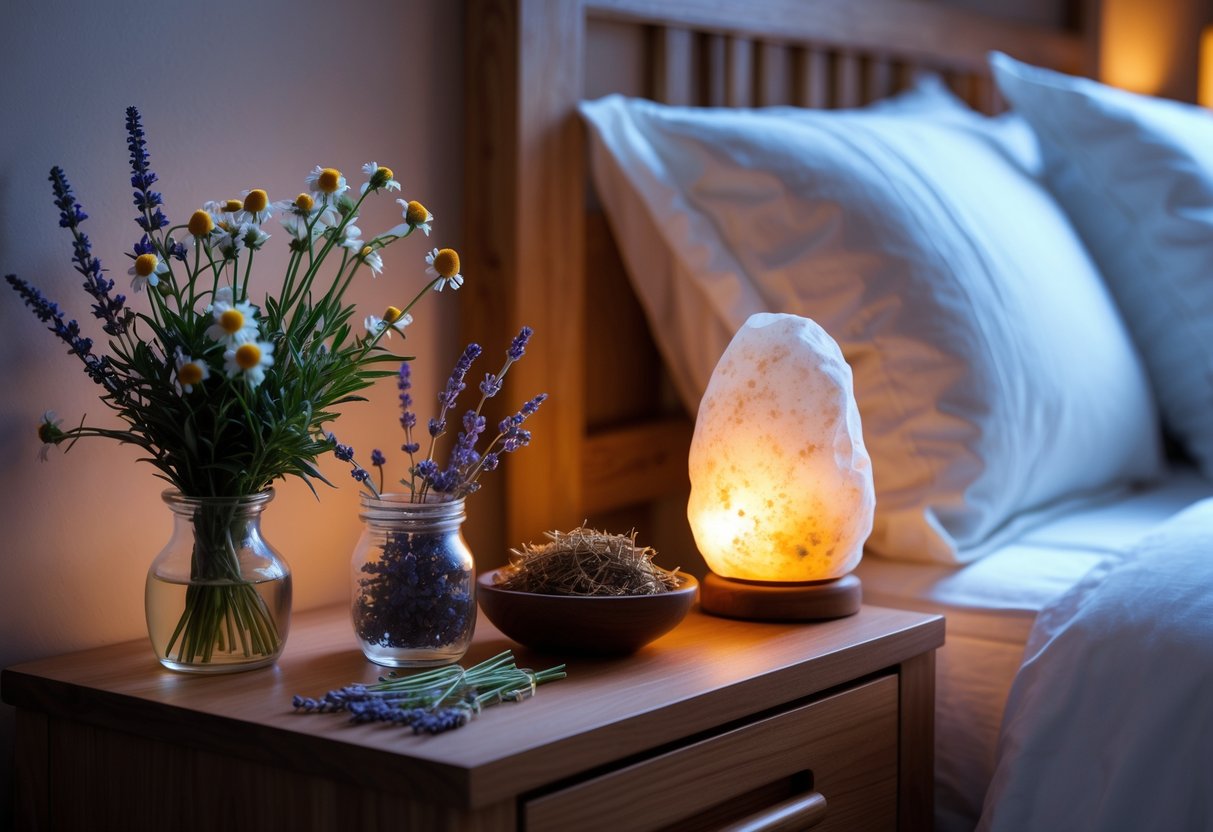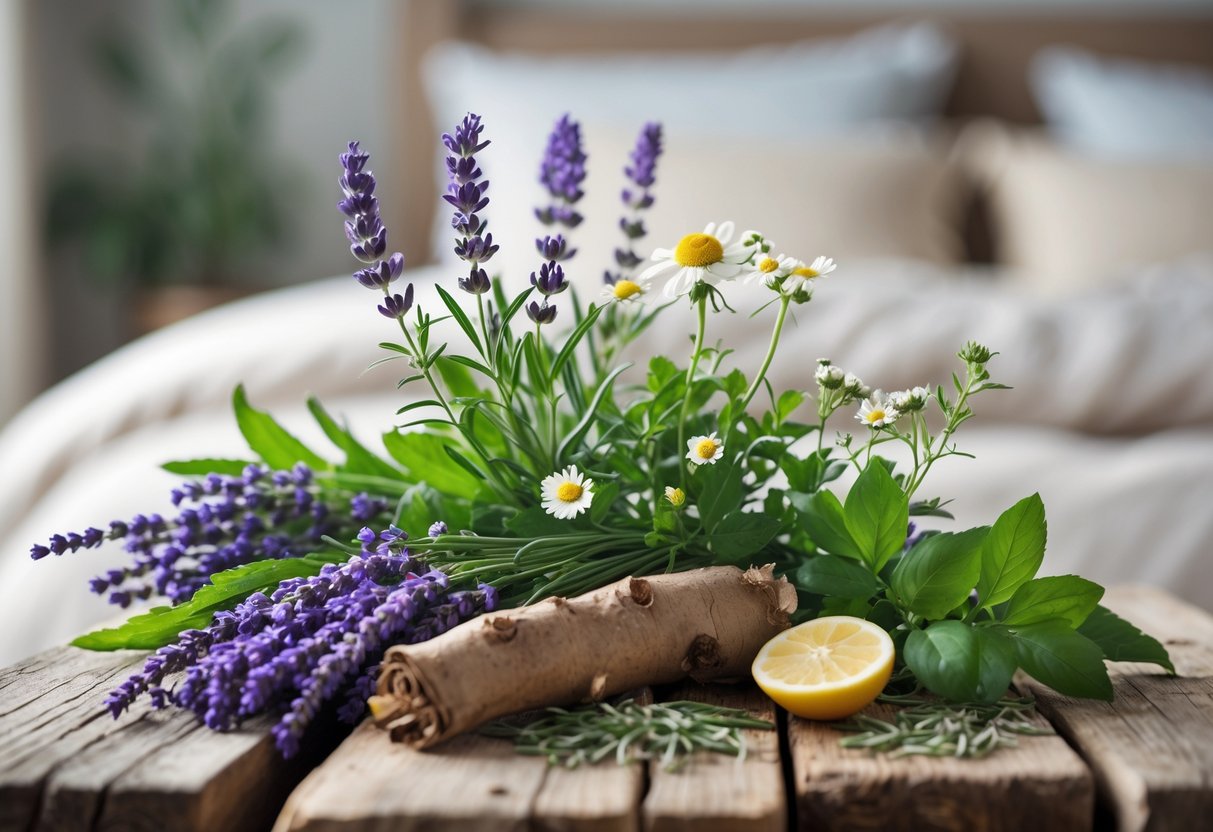Best Herbs for Better Sleep Without Melatonin: Natural Alternatives That Work
Getting enough sleep is tough for a lot of folks, and not everyone wants to rely on melatonin or prescription meds. Herbal remedies feel a bit gentler and can really help you wind down at night. Herbs like valerian root, chamomile, lavender, and passionflower have helped plenty of people fall asleep easier and wake up less groggy (herbs for sleep enhancement).
These natural sleep aids each work a little differently—some calm your mind, others relax your body. Valerian root might make you a bit sleepy, while chamomile and lavender just take the edge off. If you’re looking for something besides melatonin, these herbs are worth a try (natural sleep aids).
Key Takeaways
- Herbs can help you sleep better without using melatonin.
- Valerian root, chamomile, and lavender are go-to picks for sleep support.
- Use herbs carefully and keep an eye out for any side effects.
How Herbs Support Better Sleep

Herbs help you relax, balance your brain chemistry, and make it easier to get restful sleep. Some calm your nerves, others help you nod off faster or stay asleep longer.
Natural Sleep Mechanisms
Most sleep-friendly herbs just support your body’s natural sleep cycle. Chamomile and valerian root, for example, don’t knock you out—they just help you unwind so sleep comes more naturally.
They can also ease stress, help lower anxiety, and settle a restless mind. Honestly, it’s way easier to drift off when you’re not overthinking everything.
Chamomile stands out for its gentle effect. People have sipped chamomile tea before bed for ages, and it’s still a favorite for a reason. If you’re curious about more natural remedies, check out Johns Hopkins Medicine’s page on natural sleep aids.
Role of Relaxation and Calming Effects
Lots of herbs have a calming effect on your nervous system. Valerian root, lavender, and passionflower can relax your muscles and slow your heart rate, which makes it easier to let go of the day’s worries.
Some plants have compounds that literally tell your body to chill out. Valerian root, for example, can help you fall asleep faster and improve your overall sleep quality, at least according to several studies.
By encouraging relaxation, these herbs help with both getting to sleep and staying asleep. Brewing a cup of tea or using a bit of lavender oil before bed is simple and can be surprisingly effective. According to WebMD, chamomile is a top pick for calming your mind before sleep—more on that at natural sleep remedies.
Influence on Neurotransmitters
Certain herbs interact with brain chemicals like serotonin and GABA. These control your mood and how relaxed you feel, so they’re pretty important for sleep.
Valerian root can boost GABA levels, which quiets brain activity and helps you get restful sleep. Lavender and passionflower may work on neurotransmitters too, making it less likely you’ll keep waking up all night.
Some herbs gently balance serotonin as well, so you feel calmer without the risk of getting hooked like with some meds. That’s probably why herbal sleep remedies help some folks both fall asleep and get better quality rest. There’s more info on how herbs affect neurotransmitters over at Medical News Today’s herbs for sleep guide.
Top Herbs for Sleep Enhancement

Some herbs just make sleep come more easily. People use them in teas, supplements, or as essential oils to relax, reduce stress, and get better rest overall.
Valerian Root and Sleep Quality
Valerian root is a classic herbal remedy for sleep. It’s been used for ages, and a lot of people try valerian extract to fall asleep faster and sleep more deeply.
Research suggests valerian helps with mild insomnia and trouble staying asleep. Some studies say taking valerian root before bed (usually 300–600 mg, about half an hour to two hours before sleep) can shorten the time it takes to doze off.
It doesn’t always work right away—it might take a couple weeks to notice a difference. Most folks tolerate valerian root just fine, though some might get mild dizziness or a little stomach upset. You can read more about valerian at the Sleep Foundation.
Chamomile’s Calming Benefits
Chamomile is famous for its calming vibe. People love a cup of chamomile tea in the evening because it helps both the mind and body settle down. Chamomile has antioxidants like apigenin, which may help you feel sleepy by binding to certain brain receptors.
If falling asleep is tough, chamomile tea before bed is a common go-to. Studies show it can help some people fall asleep quicker and sleep better overall.
It’s usually safe for most adults, but if you have allergies to the daisy family, steer clear. There’s more on chamomile and other sleep herbs at Zzzquil.
Lavender and Essential Oils
Lavender is a favorite, especially as an essential oil. The scent can calm your nerves and relax your body, making it easier to drift off. Lots of people put a few drops of lavender oil on their pillow or run a diffuser in the bedroom.
Research has found that sniffing lavender before bed can improve sleep, especially if you have mild sleep issues. Lavender aromatherapy may help you fall asleep faster and wake up feeling more rested.
Lavender tea is another gentle option. If you’re curious about other natural sleep aids, including lavender, check out Healthline.
Lemon Balm for Stress Reduction
Lemon balm is an herb folks use to ease stress and promote relaxation. It’s in the mint family and smells a bit like lemons. You’ll find it as teas, extracts, or supplements.
Some people say lemon balm helps with anxiety or tension that keeps them up at night. Its calming effect is especially handy if your sleep problems are tied to stress.
Studies suggest taking lemon balm in the evening can help some people sleep better, especially when paired with other herbs like valerian. Side effects are rare but could include mild nausea or stomach pain for some. More about lemon balm is over at Greek Super Herbs.
Other Natural Sleep Aids and Supplements
There are quite a few natural ways to get better sleep besides melatonin. Some herbs and supplements can help with insomnia, calm you down, and just make sleep feel a bit more natural.
Hops for Insomnia Relief
Hops aren’t just for beer—the flowers have a long history as a natural remedy for sleep issues.
Some studies say hops can help you fall asleep faster by calming down your central nervous system and making you feel more at ease. People often mix hops with other herbs, like valerian, for a stronger effect.
Common ways to use hops include:
- Herbal teas or tinctures
- Capsules or dietary supplements
- Pillow sachets for aromatherapy
Hops don’t usually leave you feeling groggy the next morning, which is a big plus if you want a mild, plant-based sleep fix. You can get more details about hops and valerian root at Sleep Foundation.
Ashwagandha and Stress Support
Ashwagandha is an adaptogen that’s big in Ayurvedic medicine. Its main active compounds, called withanolides, can lower stress hormones like cortisol.
Research shows ashwagandha helps people who can’t settle down at night because of stress or anxiety. It helps regulate your stress response so your mind is calmer when it’s time to sleep. You’ll find ashwagandha in capsules, powders, or liquid extracts.
Many folks notice they wake up less at night after using ashwagandha for a few weeks. For best results, pair it with stress management habits and a regular bedtime routine.
Magnesium and Restful Sleep
Magnesium’s one of those essential minerals your body relies on for all sorts of things—nerve health, muscle relaxation, you name it.
Plenty of folks have found magnesium supplements helpful for sleep, especially if they’re running low on it. Not getting enough magnesium? That’s been tied to restless nights, muscle cramps, and just lying there, wide awake. You can get magnesium from foods like almonds, spinach, and whole grains, or just grab an over-the-counter supplement if that’s easier.
How does it work? Well, magnesium seems to boost melatonin, ramps up gamma-aminobutyric acid (GABA), and keeps nighttime stress in check. Some sleep supplements mix magnesium with other stuff to give you a little extra help. If you’re curious, look for products labeled for magnesium and sleep support—they’re out there.
Safe Use and Considerations
If you’re thinking about herbs for sleep, safety and your own health should come first. It’s smart to know what you’re taking, check for any possible interactions, and get a healthcare professional involved if you’re unsure.
Combining Herbs Responsibly
Mixing different herbs can make things tricky—sometimes the risks go up, or you get side effects you didn’t expect. Sure, combos like valerian with hops or passionflower pop up a lot, but even popular blends can hit people differently.
Honestly, piling on a bunch of herbal products without understanding the mix isn’t the best move. Some mixtures might knock you out too much, give you a headache, or upset your stomach.
Stick to the recommended dose. Read those labels, start small, and watch for anything weird. Also, double-check if an herb could mess with other meds you’re taking. It’s just not worth the risk.
Consulting Healthcare Providers
Honestly, checking in with your doctor or pharmacist before you start herbal sleep aids just makes sense. Herbs like valerian or ashwagandha might not play nice with blood pressure meds, sedatives, or antidepressants. If you’re pregnant, breastfeeding, or dealing with a chronic illness, you’ll want to be extra careful.
Your healthcare provider can look at your medical history and current meds, maybe even run a test or two before giving you the green light.
If you notice dizziness, trouble breathing, a racing heart, or a rash after taking any sleep aid, stop right away and talk to your provider. And don’t forget to mention all the supplements you’re taking—herbs included—when you see your doctor. It really does help keep you safer.
Consent and Individual Needs
People react differently to herbal sleep aids, so informed consent really matters here. Before trying a herb, users should know the risks, benefits, and what other options exist—even if that feels like a lot to take in at first.
Caregivers shouldn’t give herbal supplements to children, older adults, or anyone in their care without getting clear consent and making sure everyone understands the possible effects. In care settings, or when someone can’t decide for themselves, written consent is usually the way to go.
Personal preferences, values, and beliefs actually play a pretty big role when picking a sleep aid. It’s best if each person gets a say, knows what to expect, and feels comfortable giving an herbal remedy a shot. If you want to dig in deeper or just double-check things, check out this advice from Hopkins Medicine.




